Meet Foreign Students Choosing Croatian Education: Luis Vasquez from Venezuela
March 21, 2022 - Among the growing number of foreigners relocating to Croatia, international students are increasingly visible. So who are these foreign students choosing Croatia, and why? In the first of a new series, we get the perspectives of life and study in Croatia through the eyes of its foreign students, starting with Luis Vasquez from Venezuela.
Among the many foreign tongues heard around the Croatian capital these days is the growing number of students choosing to do their graduate programmes in Croatia. A safe, affordable EU country, with a rapidly expanding programme of high-quality graduate courses in English, with excellent employment opportunities upon graduation, are just some of the reasons for choosing Croatia. And the quality of that education was highlighted recently, as Algebra University College signed an academic partnership agreement with Goldsmiths, University of London (as reported previously on TCN), thereby allowing Algebra students to study under the approved programmes of one of the 500 best universities in the world according to the World University Ranking.
Despite the growing excellence of English-language graduate and post-graduate education in Croatia, the opportunities are not so well known, and so TCN - in partnership with Algebra University College - has compiled an authoritative guide to what you need to know about studying in this beautiful country. Check out the Total Croatia Study in Croatia guide.
Nothing paints the real picture of studying in a foreign country better than the real experiences of students living the day to day reality. In a new series on TCN, we meet some of the international students who have fallen in love with Croatia, many of whom plan to stay and work here if they can find employment. We look at the realities of life, why they chose Croatia, and what advice they have for others contemplating studying in Croatia.
We begin with Luis Vasquez from Venezuela who is doing a graduate course in Applied Computer Engineering at Algebra University College, with a sub-specialization in Software Engineering.
1. You chose to study in Croatia. Tell us what were the main factors in that decision.
Oh, there were definitely three main factors in my decision. First off, I found a graduate program that matched my goals in terms of skills I wanted to develop as I advanced in my career. Secondly, I have loved Zagreb ever since I came here as a tourist in August 2019 and staying in Croatia for a longer period seemed great to me. Last but not least, my family lives in Ljubljana, so being 2,5 hour by train from them was a no-brainer.

2. How is the experience so far? Give us some pros and cons.
From my perspective, my experience in Croatia has been very positive. Although I was already familiar with Zagreb before I enrolled in my master's studies, the transition was smooth for me, even as a newcomer. There are quite a few things that make Croatia a very special place to quickly adapt to it.
Pros:
- Croatia is very safe. In Zagreb, which is the city I live in, you can walk at any time of the day and not face any threat or feel unsafe at all.
- The transportation system is excellent and inexpensive. The city is interconnected with trams and there are also buses that take you to more remote areas.
- Many cafes, bars, museums and a large natural park (Maksimir) where you can run, walk or simply reconnect with nature.
- Enjoy beautiful views of most of the architecture and buildings in the city.
- Plenty of people speak English, so communicating with locals should not be a problem. Some of them speak German, Italian or Spanish, among other languages.
- Relatively speaking, the cost of living is low, although rents in Zagreb can be much higher than in other cities in Croatia.
Cons:
- Red tape is the rule in many places, especially in public institutions, so be prepared for a lot of paperwork if you are not an EU citizen.
- In some cases, the information you receive in public or private institutions is scarce or unclear, and instead of that, the real information comes from word of mouth. This often leads to inconveniences such as administrative problems, missed deadlines, additional paperwork, extra payments, fines, etc. It's usually not your fault, but you still pay the price for missing information or even receiving incorrect information from an official source.
- Croatian language can be very tricky to master if you're not familiar with any Slavic language. It is quite an interesting language, but it takes a lot of effort to catch up with it. However, this is not mandatory at all if you're only enrolling in an English language program. I have only an A2.1 level and in very few situations I needed to communicate with someone in Croatian.
- Croatia may seem less open than other countries if you're coming from a multicultural environment
- Many police officers don’t speak English, or at least, they prefer to speak in Croatian. However, if the communication for your residence permit application is by email, an online translation tool will save you.

3. How was your perception of studying in Croatia different from the reality? Give us some things that have surprised you about the experience?
I was very happy when I realized the high quality of education in the study program that I chose. Most of the teachers in my program are very knowledgeable and I personally believe that some of them are rock stars in their fields. They are also very approachable and some of them go the extra mile and are so readily available to you that I will honestly ask them for advice on time management skills. That is probably the most remarkable feature that I can highlight from my experience as a student, but I was also surprised by the large number of areas covered in my program. It also motivates me a lot to know that my classmates are very committed to their studies, although it makes sense to find a higher level of commitment in graduate studies.
4. How easy was it to do the paperwork to enroll in the study programme? Any suggestions to improve things?
Regarding the procedures to enroll in my university, Algebra University College, the process was clear and simple from the very beginning. It also helped that I had all my academic documents and the requirements at hand. My enrollment process was possible thanks to the valuable support I received from the International Office at my University, as they sped up the review of my application so that I would receive an acceptance letter on time and I could submit my documents to the police to apply for a residence permit.
The story with my residence permit application was quite different. Honestly, in 3 out of 4 residency permit applications, I was fortunate to have police officers who were very polite and even friendly, but in this case, I needed to hire an immigration lawyer to help me with this matter, as things did not progress well with the police officer reviewing my application. In the end, my lawyer managed to forward my application to the Ministry, after which I received the approval.
I think it would be great to make the official information regarding immigration in Croatia more available in English. Perhaps supported by some FAQ section by type of visa. Fortunately, there are many resources online that I have collected during my stay in the country, but still, it is a bit risky when you receive information from an official source and you cannot validate it with some official written sources, as the information might be scattered or not available in English.
5. Tell us a little about the accommodation and the cost of living.
My spending patterns have changed over time. When I came to Zagreb as a tourist, I found a private room with a shared bathroom in Dubrava and started paying 1,700 Kn (~ $ 270) per month. At that time, I estimate an average spending of $ 650 per month, ordering food about 40% of the time. After I decided to stay here longer, I started spending more, so now I pay around 3,000 Kn per month (rent + utilities) for a 2 bed + 1 bath apartment, an additional payment of ~ 590 kN (or $ 89) for health insurance (mandatory for third country citizens), and my average cost of living is around Kn 6,500 per month (~ $ 1,000), but I have to say that I order food a lot. In addition, I pay an annual tuition of around 42,000 Kn for my master's studies, which is approximately € 5,500.

6. Finding work is a key priority for students, both to help finance the study, but also upon graduation. How hard have you found it to find work, and what are the main obstacles?
My situation is a bit different as I work as a software developer for a foreign client. However, I have received a few messages from local recruiters, which gives me a sense that the local job market in my area is in high demand. This is my perspective as a software developer, but my intuition is that businesses in Croatia are growing and the startup scene is getting hotter, so I bet there is currently a need or there will be in the mid-term, for many more professionals in different areas. Just to mention one example, in my last class before Christmas season, an instructor mentioned an open position for an entry-level data scientist / software engineer related to a large project that was recently awarded to one company. He asked us if any of us were interested in considering this role, so even as a student, some opportunities might knock on your door.
7. Tell us about the Croatian lifestyle and making friends. How has it been for you?
The first time Croatia struck me in a fun way was when I learned about the coffee culture here. You can go for coffee and easily spend hours talking to someone. I learned of this fact from my first landlady here, Marija, who kindly opened the doors of her house to me when I was looking for a place to rent. A special shout out to her mom, who cooks the best desserts I have tried in Croatia. Since then, I have experienced something of the "go for a coffee" lifestyle.
My first group of friends was made up of classmates from a Croatian language course. We were of very different origins: Algeria, Ethiopia, India, Italy, Russia, South Korea, United States and Venezuela (myself). I was lucky enough to befriend all my classmates, among whom I remain in touch with Chichi (a dear friend from Ethiopia), Kristina (the best Croatian teacher) and Ritika (a smart MD student from India). Still, the pandemic made things a bit tricky when classes moved online, but every now and then it's fun to go out for coffee with a friend. I also made a couple of friends from Spain this semester of my studies, and since we are enrolled in the same courses, we managed to find time for study sessions. With them, there are definitely a lot of cultural affinities, but sometimes, it's great to reconnect with your mother tongue, although I'm not sure we understand 100% of the time due to the different jargon, but 99% of the time we catch up with our different accents, words and speech styles.
I have lived in three other countries and I think Croatia is more open on average, but I find very rewarding when I interact with people from different cultures.
8. Do you plan to (try and) stay in Croatia when your studies finish? Why/not?
Absolutely. My goal is to stay here after finishing my studies. My current job is 100% remote so I could stick with it while being here after I graduate, but it will also depend on the type of visa available at the time. Apart from all the pros I mentioned earlier, there is also a specific one for me, as I'm involved in a startup-like project that is part of my master's studies. I am part of a team that is developing a game-based learning app for children. We really have a great product in the works and we are all looking forward to taking it to the next level. I can't say 100% sure that I will stay in Croatia if my career path requires me to relocate, but either way, Croatia has had a lasting impact on me, so let's see what the future holds.
9. Three things you have enjoyed most about your experience studying in Croatia?
- The quality of education and instructors
- Cost of living
- Personal safety
10. What advice do you have for people who are considering studying in Croatia?
I highly recommend trying Croatia if you are looking for a quality education at a reasonable cost of living.
If you are a third-country citizen, you may find the paperwork cumbersome, but in my personal experience it is well worth the effort. Hopefully, things will improve in the future and problems with clarity or availability of information will eventually be minimized.
In any case, there is plenty of information online on sites like Total Croatia News or Expat in Croatia, about most of the procedures for applying for a study-based residence permit, finding accommodation, etc. I also recommend checking out njuskalo.hr and index.hr/oglasi/ for accommodation. Both sites are only available in Croatian, but you can use an integrated online translation service to navigate them so you can get the content translated in real time.
Are you an international student on a graduate or post-graduate course in Croatia, who would like to be featured in this series? Contact us on This email address is being protected from spambots. You need JavaScript enabled to view it. Subject Study.
To learn more about the options for studying in Croatia, check out the Total Croatia Study in Croatia guide.
For more information on courses offered by Algebra University College, visit the official website.


